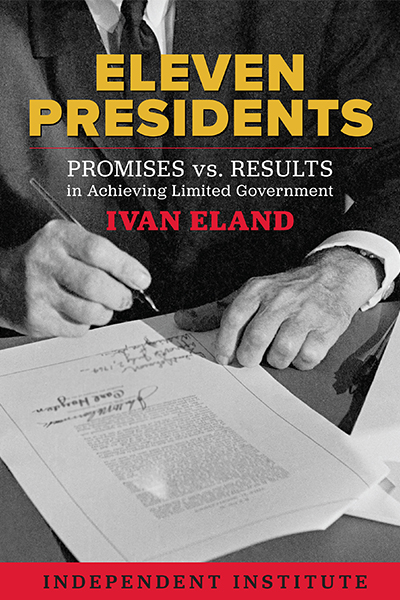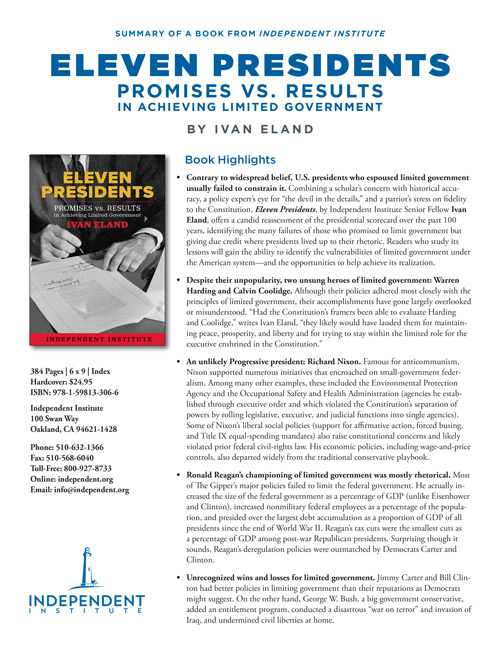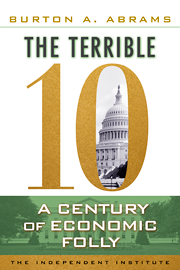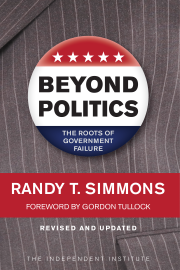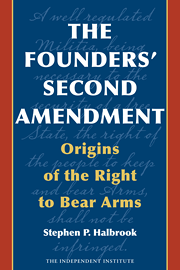| List Price: | ||
| Price: | $19.95 | |
| Discount: | $5.00 (Save 20%) |
| List Price: | ||
| Price: | $19.95 | |
| Discount: | $5.00 (Save 20%) |
Overview
Presidents who claimed to limit government often actually did the opposite. History often looks unfavorably on presidents who may have actually contributed smart and important policies. Were Harding and Coolidge really as ineffective as their reputations maintain? Did Hoover not do enough to end the Depression? Was Reagan a true champion of small-government conservatism?
We all know that the American president is one of the most powerful people in the world. But to understand the presidency today we often have to learn from the past. Author Ivan Eland offers a new perspective in Eleven Presidents on the evolution of the executive office by exploring the policies of eleven key presidents who held office over the last one hundred years: Warren G. Harding, Calvin Coolidge, Herbert Hoover, Dwight D. Eisenhower, Richard Nixon, Gerald Ford, Jimmy Carter, Ronald Reagan, George H. W. Bush, Bill Clinton, and George W. Bush. The book combines an exploration of how political currents shape historical legacies with an in-depth analysis of presidents’ actual policies. An important, revealing book about the presidency, legacy, and the formation of history, Eleven Presidents is essential reading for understanding the American presidency.
Contents
1. Popular Reputations Depend on Political Rhetoric
2. Years of Normalcy and Restraint
3. Domestic Troubles But No Foreign Entanglements
4. Smaller Government at Home and Abroad
5. Watergate and a More Restrained Foreign Policy
6. Limited Government Starts to Return
7. Busting the Myths
8. Hawkish Tendencies
9. A Good Fiscal Record Counts
10. Big Government at Home and Abroad
11. Political Rhetoric and Hypocrisy
Notes
Bibliography
Index
Detailed Summary
- Contrary to widespread belief, U.S. presidents who espoused limited government usually failed to constrain it. Combining a scholar’s concern with historical accuracy, a policy expert’s eye for “the devil in the details,” and a patriot’s stress on fidelity to the Constitution, Eleven Presidents, by Independent Institute Senior Fellow Ivan Eland, offers a candid reassessment of the presidential scorecard over the past 100 years, identifying the many failures of those who promised to limit government but giving due credit where presidents lived up to their rhetoric. Readers who study its lessons will gain the ability to identify the vulnerabilities of limited government under the American system—and the opportunities to help achieve its realization.
- Despite their unpopularity, two unsung heroes of limited government: Warren Harding and Calvin Coolidge. Although their policies adhered most closely with the principles of limited government, their accomplishments have gone largely overlooked or misunderstood. “Had the Constitution’s framers been able to evaluate Harding and Coolidge,” writes Ivan Eland, “they likely would have lauded them for maintaining peace, prosperity, and liberty and for trying to stay within the limited role for the executive enshrined in the Constitution.”
- An unlikely Progressive president: Richard Nixon. Famous for anticommunism, Nixon supported numerous initiatives that encroached on small-government federalism. Among many other examples, these included the Environmental Protection Agency and the Occupational Safety and Health Administration (agencies he established through executive order and which violated the Constitution’s separation of powers by rolling legislative, executive, and judicial functions into single agencies). Some of Nixon’s liberal social policies (support for affirmative action, forced busing, and Title IX equal-spending mandates) also raise constitutional concerns and likely violated prior federal civil-rights law. His economic policies, including wage-and-price controls, also departed widely from the traditional conservative playbook.
- Ronald Reagan’s championing of limited government was mostly rhetorical. Most of The Gipper’s major policies failed to limit the federal government. He actually increased the size of the federal government as a percentage of GDP (unlike Eisenhower and Clinton), increased nonmilitary federal employees as a percentage of the population, and presided over the largest debt accumulation as a proportion of GDP of all presidents since the end of World War II. Reagan’s tax cuts were the smallest cuts as a percentage of GDP among post-war Republican presidents. Surprising though it sounds, Reagan’s deregulation policies were outmatched by Democrats Carter and Clinton.
- Unrecognized wins and losses for limited government. Jimmy Carter and Bill Clinton had better policies in limiting government than their reputations as Democrats might suggest. On the other hand, George W. Bush, a big government conservative, added an entitlement program, conducted a disastrous “war on terror” and invasion of Iraq, and undermined civil liberties at home.
During the past 100 years, many U.S. presidents have cultivated a public image of championing limited government. Few have lived up to that image. Most in the Oval Office—even self-proclaimed conservatives who’ve staked their reputations on rolling back big government—have presided over periods of growing federal spending, debt accumulation, and government bureaucracy. Too often, however, the public has failed to notice the yawning gulf between rhetoric and reality. Common assumptions about political party affiliation have also helped mask the facts.
Ivan Eland (Senior Fellow, Independent Institute) reveals the breadth and depth of the broken promises—as well as some underappreciated successes—in his seventh book, Eleven Presidents: Promises vs. Results in Achieving Limited Government, examining the record of American presidents, since the end of World War I, who pledged more or less to restrain or reverse the growth of federal power: Harding, Coolidge, Hoover, Eisenhower, Nixon, Ford, Carter, Reagan, Bush I, Clinton, and Bush II.
Harding and Coolidge: Return to Normalcy
Until the last decades of the 1800s, America’s elite classes viewed a large and powerful central government with suspicion. This consensus eroded during the Progressive era. Not until U.S. involvement in World War I, however, did opinion-makers throughout society grudgingly accept a greater role for the federal government in American life. Warren Harding (president from 1921 to 1923) wouldn’t have any of this.
Harding is mostly remembered for the Teapot Dome scandal, and Calvin Coolidge (president from 1923 to 1929) for continuing Harding’s counterrevolution. Pundits have focused far too little on their policies, which says much about the lack of perspective in current standards of presidential performance.
Hoover’s Domestic Troubles, but No Foreign Entanglements
Herbert Hoover (president from 1929 to 1933) viewed himself not as an economic conservative in the Harding-Coolidge mold, but rather as a moderately progressive Republican. With the onset of the Great Depression, he initiated economic interventions that deepened and prolonged the economic downturn.
Nevertheless, Hoover’s foreign policy was the least interventionist of any president in the 20th century. Eschewing U.S. military involvement abroad, he brought American troops home and agreed with other major nations to limit the construction of warships. His record on political and economic liberties, however, was generally poor.
Eisenhower’s Smaller Government at Home and Abroad
Dwight Eisenhower (president from 1953 to 1961) maintained that FDR’s New Dealers strayed too far from the principle of federalism, weakening the states through excessive national taxation. He pledged to “hold the line” against federal encroachment against the states and the lives of ordinary Americans. He also held that it was the government’s role to redistribute wealth to the less fortunate. His effort to expand Social Security extended the New Deal legacy he generally criticized.
Eisenhower’s record on fiscal issues, however, is one of staunch conservatism. One of the top budget hawks to occupy the Oval Office, the retired five-star army general even took the axe to defense spending. Although he avoided using US combat forces, his covert scheming to overthrow of unfriendly (but freely elected) governments in the developing world sometimes had future unfortunate consequences.
Nixon and Ford: Watergate and a More Restrained Foreign Policy
Richard Nixon (president from 1969 to mid-1974) pursued an activist agenda. Rather than pursuing balanced budgets, he pledged allegiance to Keynesian deficit spending. His devaluation of the dollar had less to do with earnest statesmanship than with political ambition; his wage and price controls only masked the inflationary policies he helped engineer.
Nixon’s record on foreign policy is complicated. In 1968, he campaigned to end the Vietnam War, yet in secret he prolonged it by undermining President Johnson’s negotiations with the North Vietnamese. His escalation of the conflict cost an additional 22,000 American lives and orders of magnitude more Vietnamese, Cambodian, and Laotian lives.
When Gerald Ford filled the vacancy left by Nixon’s resignation in 1974, he did little to challenge the entrenched system of an activist federal government. His disposition, however, also meant that U.S. relations with China and the Soviet Union would continue to thaw, a break from the more confrontational anticommunism of Johnson, Kennedy, and Truman. His unconstitutional pardon of Richard Nixon besmirched his short presidency.
Jimmy Carter Begins the Return of Limited Government
Jimmy Carter (president from 1977 to 1980) isn’t remembered for pursuing a free-market, constitutionalist agenda. Nevertheless, he set precedents in limiting government for which Ronald Reagan later received credit. Even during Carter’s successful campaign, the evangelical Georgian called for welfare reform, deregulation, a balanced budget, and other policies associated with conservatism.
In office, Carter established two new cabinet-level federal departments—Education and Energy—but he restrained the growth of federal spending relative to the nation’s economic output, deregulated four major industries, and appointed a Federal Reserve chairman who dried up inflation by tightening the monetary spigot. Carter’s reduction of unneeded American military action abroad resulted in one of the least interventionist foreign policies in the century.
Busting the Reagan Myths
Ronald Reagan (president from 1981 to 1988) has the reputation of a conservative without peer, a view resting on several misconceptions, beginning with the notion that he won the Cold War. In reality, while Reagan’s military buildup and rhetoric probably did frighten the Soviets, the main cause of the USSR’s collapse was Mikhail Gorbachev, who partially opened up the Soviet system and made the critical decision to not send troops to prop up Eastern European allies in mid-1989, after Reagan had left office.
Reagan was famous for his small-government rhetoric, but his modest cuts in income-tax rates and his hike in defense spending led to record budget deficits and national indebtedness. Despite his campaign rhetoric of making the nation’s old-age pension system voluntary, he raised Social Security taxes, shoring up the faltering program for only a couple of generations. He gave up his pledge to introduce market reforms into the Medicare program and approved its expansion in 1986.
George H. W. Bush’s Hawkish Tendencies
George H. W. Bush (president from 1989 to 1992) may have a public image as a “wimp,” but such a reputation is unwarranted. The 41st U.S. president wielded military power more significantly than did Reagan—to the detriment of limited government. Almost one year after he invaded Panama, he successfully helped drive out Iraq from Kuwait, but with major unintended consequences.
Bush also missed a historic opportunity to deliver U.S. taxpayers a major peace dividend after Gorbachev effectively ended the Cold War in mid-1989. Instead Bush helped expand NATO into Central and Eastern Europe, setting the stage for later troubles with a resurgent Russia. Nevertheless, Bush reduced the only existential threat in American history, with his arms-control treaties with the Soviet Union. His pardons related to the Iran-Contra scandal were a stain on a presidency that badly needed to restore integrity to the executive branch and hold guilty parties to account for their misdeeds.
Clinton’s Often-Ignored Fiscal Conservatism
Conservatives may be skeptical, but Bill Clinton did more to limit the federal government than have most Republican presidents. He offered a conservative agenda, although he never called it that, and on many counts he delivered the goods. During his tenure, federal spending fell as a percentage of GDP more than under any president since Truman demilitarized the economy after World War II. Although he raised taxes the increase was lower in constant dollars (and a smaller portion of GDP) than Reagan’s 1982 tax hike. These and related measures, together with prudent Federal Reserve policies, helped spur one of the longest periods of economic growth in U.S. history.
His “Reinventing Government” initiative streamlined the federal bureaucracy and cut the federal workforce by 350,000—the largest reduction since Truman. He ratified the North American Free Trade Agreement and scrapped Depression-era banking restrictions. He buttressed federalism by ending unfunded federal mandates on the states.
George W. Bush’s Big Government
Despite his numerous military interventions overseas, Clinton managed to avoid embroiling U.S. forces in a large foreign quagmire on the ground. The same cannot be said of George W. Bush, who landed the United States in exhausting and costly sinkholes in Afghanistan and Iraq, despite having criticized Clinton’s nation-building adventures in his first run for the presidency.
The Iraq war, one of the worst policy mistakes in U.S. history, helped to break Bush’s campaign promise of a humbler foreign policy. Ill-advised on its own merits—it diverted focus away from al-Qaeda and its allies, and ended up inspiring more anti-U.S. terrorism from new enemies—the war also eroded the political capital that Bush had hoped to spend on reforming immigration, Social Security, and the tax code.
The broadly waged (and misnamed) War on Terror also shrank civil liberties at home through new surveillance programs, indefinite detention of suspected terrorists without a trial, and CIA secret prisons and torture around the world. “Thus, Bush hardly fulfilled his promises to limit government,” Eland concludes.
Praise
“Ivan Eland’s Eleven Presidents looks to be as indispensable as his last excellent book on the U.S. presidents, Recarving Rushmore. How well have American presidents since World War I done in keeping their promises to constrain government? Read this book!”
—Ron Paul, former U.S. Congressman and candidate for U.S. President
“Ivan Eland has done it again. In Eleven Presidents, he looks at the history of the presidency from an entirely new perspective. Along the way, this well-written and thoroughly researched book persuasively challenges the conventional wisdom at every turn. Even when readers disagree with Eland’s interpretations, he will make them think and ponder.”
—David T. Beito, Professor of History, University of Alabama; author, From Mutual Aid to the Welfare State: Fraternal Societies and Social Services, 1890-1967
“Political conservatism may or may not be out of ideas as some of its adversaries claim, but sincere small-government advocates like Ivan Eland in Eleven Presidents are continuing to stimulate debate in original and highly interesting ways.”
—Richard Shenkman, Founder and Publisher, History News Network
“‘All is not what it first appears to be in presidential history,’ as the excellent volume Eleven Presidents makes painfully clear. The book offers a devastating critique of Republican presidents and their ‘limited government hypocrisy.’ Beginning with Herbert Hoover, GOP presidents have expounded on the benefits of smaller government but expanded it nonetheless. (Dwight Eisenhower gets credit for being the one Republican president who kept his promises.) ‘Watch what they do, not what they say’ is a lesson to be learned from this insightful volume. Carefully comparing promises with results, Eland shows how GOP presidents, from Hoover to George W. Bush, have been Big Government Republicans, despite their rhetoric about ‘limited government.’ Eleven Presidents turns historical assessments of U.S. Presidents upside down—and makes for a fascinating read. Eland makes a good case that Warren Harding and Calvin Coolidge, normally ranked low in presidential polls that prize presidential ‘energy,’ were in fact two of our greatest presidents when judged by keeping their promises to limit government, both here and abroad. The lesson here is that neither major political party is committed to limited government in practice. While there are episodes of deregulation (under Jimmy Carter) or restrained spending (Eisenhower, Clinton), government grows inexorably. So, what is to be done? Eland states that the ‘continuing hypocrisy of promising limited government and then not delivering it should be penalized [by voters], not rewarded.’ Whether there is any public will to hold presidents accountable or not is then a serious question for readers to ponder.”
—Jonathan J. Bean, Professor of History, Southern Illinois University
“Whatever prospects lie ahead for limited government, the rule of law, and authentic Constitutionalism, Americans first need to know their history. Leviathan did not emerge by accident. Democrats and Republicans alike have built the welfare-warfare state over the past century. Even self-described ‘conservatives’ have been complicit. In a moment when labels seem to be losing their meaning and once-familiar categories have been upended, Americans find themselves facing urgent questions about the political, economic, and social conditions necessary to a free society. In his important and well-written book Eleven Presidents, Ivan Eland unmasks the pretensions of power in Washington, D.C., and invites us to take a fresh and honest look at deeds more than words, at policy more than rhetoric.”
—Richard M. Gamble, Anna Margaret Ross Alexander Chair in History and Politics, Hillsdale College
“Ivan Eland sets out to puncture the widely-held impression that Republicans acted as the party of limited government over the last 100 years. In the closely argued book Eleven Presidents, he succeeds very well. With the exception of Harding, Coolidge, and to some extent Eisenhower, the author shows that government spending and the national debt, measured against the nation’s GDP, rose faster under Republican presidents than under Democrats. Some may disagree with Eland’s view that this fact is unfortunate, but none can dispute the fact itself.”
—James H. Broussard, Professor of History and Director, Center for Political History, Lebanon Valley College
“Finally, with Ivan Eland’s Eleven Presidents we have the much-needed book that deals directly with what Gary Gregg calls the ‘cult of the presidency’—the obsession with the notion that Presidents can solve all of our problems from the White House by just raising the debt ceiling over and over again. The constant overpromising of Presidents and presidential candidates has enshrined the panacea of government deliverance from all of our problems. Or what William F. Buckley, Jr., in addressing Lyndon Johnson’s Great Society, called ‘the myth of salvation by brick and mortar.’ Eleven Presidents examines the counterpoint to the notion that Presidents can stop the rise of the oceans with the assertion that presidents can return to limited government. Bill Clinton asserted in a State of the Union address that ‘the era of big government, as we’ve known it, is over,’ but since then the national debt has gone up by trillions, not merely hundreds of billions, of dollars. Reagan truly believed that the size and scope of the federal government could be scaled back, but then he proceeded to let stand the new Department of Education despite promising to abolish it. Similarly, George W. Bush promised not to engage in ‘nation-building’ but then proceeded to enter into one of the nation’s most grandiose nation building projects in history with the war in Iraq. The great promise to return to limited government, as Elands demonstrates, has met with little success. Republican presidents far outnumber Democrats in the promise of a return to limited government, but their rhetoric has far outweighed the reality of their accomplishments. This book is sobering and enlightening in showing the gap between the mostly Republican promise of limited government and the seemingly inexorable march toward the Leviathan state. The book is a welcome addition to the literature on the presidency. It reminds the reader of William Howard Taft’s words: ‘The President cannot make clouds rain or crops grow.’ We can add to the list, that presidents, for the most part, seem incapable of scaling back the growth of the federal government and returning to some semblance of constitutional restraint.”
—Phillip G. Henderson, Professor of Politics, Catholic University of America; author, Managing the Presidency: The Eisenhower Legacy-From Kennedy to Reagan; editor, The Presidency Then and Now
“Some idols deserve to be smashed, particularly when it comes to the American presidency. In Eleven Presidents, Ivan Eland sets about the task with a bracing iconoclasm, toppling alleged ‘greats,’ and elevating others—like Warren Harding and Jimmy Carter—who’ve never gotten the respect they deserve. ‘All is not what it first appears to be in presidential history,’ Eland writes; but readers of Eleven Presidents will get a clear-eyed view of which presidents gave lip service to limited government—and which actually delivered.”
—Gene Healy, Vice President, Cato Institute; author, The Cult of the Presidency: America’s Dangerous Devotion to Executive Power
“In Eleven Presidents, Ivan Eland has deployed his encyclopedic knowledge of twentieth-century political history and his superb analytical ability—with groundbreaking results. Delivering even more than the title promises, this much-needed, liberty-minded work of scholarship gives us an objective comparative history of what we might call the limitations on limited government from the perspective of the White House over the last hundred years. Along the way, this fine book becomes no less than a political history of the last hundred years, as well as a trove of Eland’s insights . . . and some surprises as well.”
—T. Hunt Tooley, Professor of History, Austin College; author, The Western Front: Battleground and Homefront in the First World War
“Republicans claim to be the party of the Constitution. They have since the early 20th century cultivated the image that they and their presidents are in favor of limited government while the Democrats and their presidents are in favor of big government. Ivan Eland, senior fellow and director of the Center on Peace & Liberty at the Independent Institute, in his new book Eleven Presidents: Promises vs. Results in Achieving Limited Government, shows, conclusively, that this is not the case. Eland concludes that ‘Republican presidents in the last hundred years have often failed to limit government.’ Only three Republican presidents—Harding, Coolidge, and Eisenhower—‘had much of a record of doing so.’ And surprisingly, the Democrats Jimmy Carter and Bill Clinton ‘actually have not received enough credit for their efforts to limit government.’ . . . I cannot recommend the book highly enough. Not only does it demolish the myth that the Republican Party is the party of the Constitution and limited government.”
—LewRockwell.com
“Eleven Presidents: Promises vs. Results in Achieving Limited Government evaluates the claims to limit government against their performance in office for eleven US Presidents. Discusses how popular reputations depend on political rhetoric; years of normalcy and restraint—Warren G. Harding and Calvin Coolidge; domestic troubles but no foreign entanglements—Herbert Hoover; smaller government at home and abroad—Dwight D. Eisenhower; Watergate and a more restrained foreign policy—Richard Nixon and Gerald Ford; limited government starting to return—Jimmy Carter; busting the myths—Ronald Reagan; hawkish tendencies—George H. W. Bush; how a good fiscal record counts—Bill Clinton; big government at home and abroad—George W. Bush; and political rhetoric and hypocrisy.”
—Journal of Economic Literature

